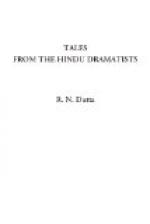A cry of distress is now heard, and on looking out, the youths observe Guha, the friendly forest monarch, assailed by the demon Kabandha, or a fiend without a head. Lakshmana goes to his aid, and returns with his friend Guha. In the act of delivering him, Lakshmana tosses away the skeleton of Dundubhi, a giant, suspended by Bali, who, deeming this an insult, presently appears. After a prolix interchange of civility and defiance, Rama and Bali resolve to determine their respective supremacy by single combat. Bali is slain. His brother Sugriva is inaugurated as king and determines to assist Rama to recover Sita. A bridge is built over the sea. Rama’s army advance to Lanka. Kumbhakarna, a brother of Ravana, and Meghanada, a son of Ravana, go forth to battle. Malyavan wishes them prosperity in a phrase perfectly oracular. They are slain. Ravana now takes the field himself. Malyavan resolves to follow him and resign, on the sword, a life now useless to his sovereign. The king is overthrown. Sita is recovered.
Rama with his wife and brother, accompanied by Vibhishana, the brother of Ravana, and Sugriva, mounts the celestial car, which was once wrested by Ravana from his brother Kuvera, and sets out to proceed to Ayodhya.
On the way the travellers descry the Sumeru mountain, the Malaya mountain, the Dandaka forest, the mountain Prasravana, the Godaveri river, mount Malyavan, Kundinipura in the Maharashtra country, the shrine of Bhimeswara, the city of Kanchi, Ujayin, the temple of Mahakala, Mahishmati the capital of Chedi, the Jumna and Ganga rivers, Varanasi, Mithila or Tirhut, and Champa near Bhagalpur.
They then proceed westward to Prayaga, and Antarvedi or Doab, when they again follow an easterly course and arrive at Ayodhya.
Bharata, Satrughna, Vasishtha the priest and the people of Ayodhya await the arrival of the party and receive them most cordially. Rama is now crowned king.
VENI SAMVARANA OR VENI SANHARA
OR
“THE BINDING OF THE BRAID OF HAIR.”
Draupadi, the wife of the Pandavas, is dragged by the veni or braid of hair into the public assembly by the hand of Duhsasana, one of the Kaurava princes, a disgrace that weighs most heavily upon the Pandavas, who contemplate most bitter revenge.
Krishna returns to the Pandava camp from a visit to the Kaurava princes, as a mediator between the contending chiefs. Ferocious Bhima expresses, to his brother Sahadeva, his refusal to have any share in the negotiations instituted by Krishna and his determination to make no peace with the enemy until the insult offered to Draupadi is avenged. He announces his resolution, in case the dispute be amicably adjusted, to disclaim all connection with his own brothers, and throw off obedience to Judhishthira.
The price of peace is the demand of five villages or towns, Indraprastha, Tilaprastha, Mansadam, Varanavatam, and another. Sahadeva attempts to calm the fury of Bhima, but in vain; and Draupadi, with her hair still dishevelled, and pining over her ignominious treatment, comes to inflame his resentment. She complains also of a recent affront offered by Bhanumati, the queen of Duryodhana, in an injurious comment upon her former exposure, which serves to widen the breach.




